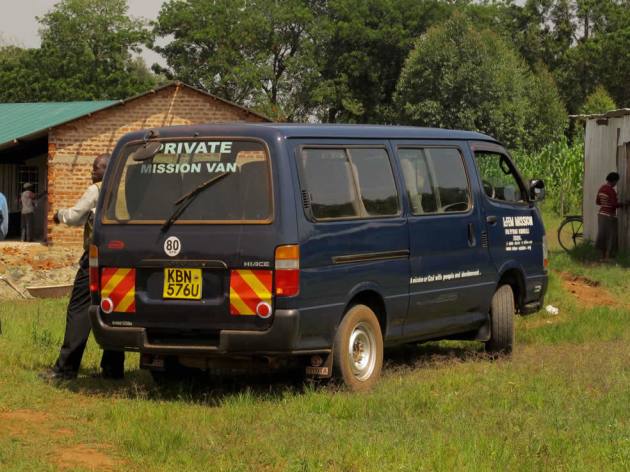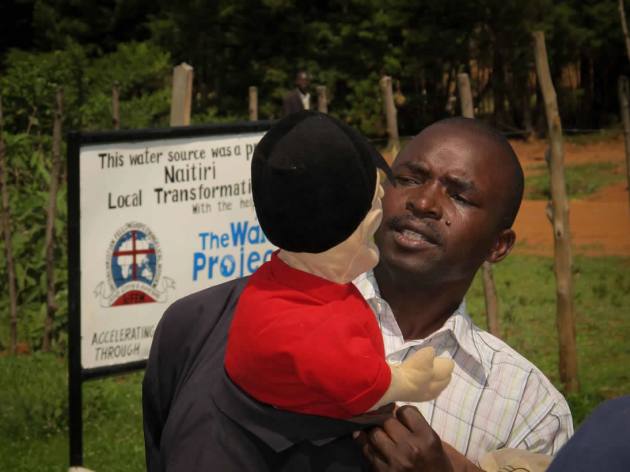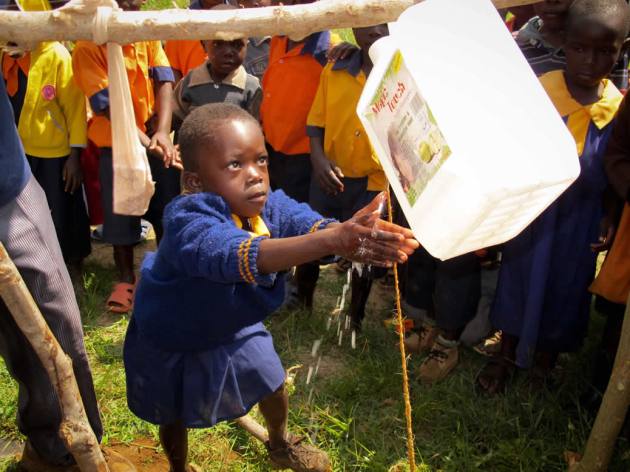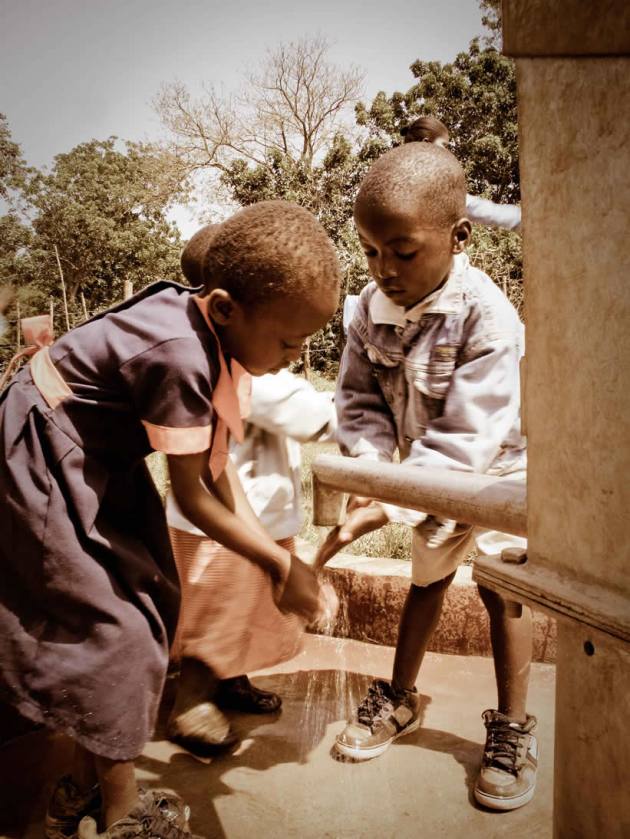Kenya’s Warriors for Water
August 2, 2012 Leave a comment
Kimilili is a surprisingly large town at the base of east Africa’s fourth highest mountain. Our purpose of visit to this slightly out-of-the-way spot was the IcFEM – Interchristian Fellowships’ Evangelical Mission. The IcFEM is a Kenyan founded organisation that operates in a 90 km² area centred around Kimilili and is (among many other things) one of The Water Project’s in-country partners. When we asked to visit the IcFEM we met a warm welcome and abounding enthusiasm to show us what they do. A few weeks later, when we eventually arrived, their enthusiasm hadn’t waned a bit.
Arriving in Kimilili we were not quite sure where to find the IcFEM premises. As we blundered around town we were interrupted by a woman yelling “STOP! STOP!” from the back of a blue minibus. She turned out to be Ruth, the main “mama” at IcFEM. She was about to leave for Webuye with Solomon (IcFEM head) and several other staff members. We’d caught them just in time!
We settled into the IcFEM guest house and were introduced to Ben and Anthony. Ben is a Welsh student who, having previously done a GAP year with the IcFEM, had returned for his vacation to help out and volunteer. Anthony is a Kimilili local, born and bred, who is now employed full-time to run the IcFEM IT Centre. This centre offers computer skills training to local people at a heavily subsidised cost, made possible through the donation of computers from the UK and sponsored maintenance of the centre.
The next day we were loaded up in the IcFEM “Private Mission Van” with various other employees – Michael, Francis and others – and bounced off to a brand-new local primary school where they were conducting one of their WASH (WAter, Sanitation and Hygiene) programmes. The team put on a phenomenal performance for the young kids, using songs and puppet shows to illicit an unbelievably energetic and excited response. The purpose of the programme is to pass on the basics of washing hands, educate people on safe latrine use, cleaning food and –perhaps most importantly – how to set up the basic infrastructure required to do these things in their homes. At each school they construct a “Tippi-Tap” and show students how to use it. Consisting of four wooden poles and a 5lt bottle with a piece of soap in a stocking dangling nearby, the Tippi-Tap is an ultra-simple, cheap and convenient means for children to safely wash their hands at school and home. Of course, refilling the Tippi-Tap becomes tricky if you don’t have easy access to water, so the IcFEM is constantly working with organisations like The Water Project to fund the construction of borehole pumps at these schools.
When we chatted to the IcFEM crew they said that although most of their pumps are new (so perhaps the test has yet to come) they have helped the PTAs of each school open a trust into which pump users pay a small monthly instalment to fund the repair and maintenance of the pumps. So far so good! In several communities people living near to the schools have been able to open small businesses thanks to the pumps – like vegetable gardens and brick manufacturers. In the case of Halfland Primary, the well arrived before the construction of the school was complete. Having water on site saved the school board R6800/month in water transport costs! If providing education is a major priority then enabling under-funded, rural government schools to do as much as they can with what little they get is vital and we think the IcFEM approach to infrastructure and community development is a pretty effective means of doing this.
After Halfland primary we visited St Veronica preparatory school, an older, larger school with far worse facilities. The class rooms were constructed out of mud compacted over simple skeletal structures of cut poles. Of the three classes we saw, only one had a black board which was cracked and broken. Still the students exploded with excitement at our arrival and with so many students pushing to see, conducting the WASH programme in a vaguely orderly manner was actually quite difficult. The crowd literally erupted with laughter when the puppets appeared and Michael had to remove them again to gain any resemblance of quiet! The staff at St Veronica’s had already implemented a Tippi-Tap-like system; barrels of water hung from stakes with small holes near their base. These were plugged with a stick or nail which can be removed to wash hands in the resultant thin stream of water. The IcFEM team explained how the model can be improved into a Tippi-Tap and the staff seemed happily open to and thankful for the suggestion.
For the afternoon we visited the IcFEM Hospital and School. The IcFEM hospital aims to complement the larger government hospital in Kimilili. Kimilili Hospital can only provide patients with very basic care, lacking facilities for x-rays, neonatal care and specialist paediatrics for example. The IcFEM hospital offers these among many other services for highly subsidised prices. One patient we met was Samuel, a boy who an IcFEM team found while out working in the community. Samuel was one of about 8 abandoned or orphaned children living with an elderly woman who struggled to keep them alive. Samuel had been malnourished all his life and so, now 7 years-old, he was only just over two feet long and weighed less than 20 kilograms! His limbs were deformed and as he lay asleep in his bed, his lungs heaved under the effort of breathing. The elderly woman caring for Samuel had no means to make contact with or transport him to a hospital. In any event we were told the government hospitals lacked the resources to keep and feed him for any extended period of time.
Our day ended at the IcFEM school, a small private school subsidised by the IcFEM. The children here were noticeably more engaging, vocal and confident than those visited earlier. This was evident in the proud and eager manner in which they showed off their knowledge of Kenyan geography. However children attending schools like IcFEM’s school are privileged and few. Blackboards, relatively small class sizes and text books for every child aren’t the norm and at R2000.00 a year, it is relatively expensive for most community members.
Looking back there are many aspects we enjoyed about the IcFEM structure. All of the employed staff we met were born within the surrounding area. Sure many of them had perhaps not come from the poorest of local families, but the IcFEM structure has offered locals with a school leaver (or higher) qualification an opportunity to simultaneously earn, personally grow and contribute towards their community. This allows people like Anthony and Solomon –well educated, respected and high capacity individuals – to remain in Kimilili. Despite obvious financial incentives for these people to leave they are driven to stay by their loyalty to the community. Another local man told us that Solomon was a big character in the area and had even been asked on several occasions to run for mayor or represent the community politically. He has always declined, choosing to remain the paternal character of the IcFEM family.
As an organisation, IcFEM seems to be making real progress in empowering the Kimilili community to help itself. This is what we think aid and resultant development is about; insuring infrastructure and healthcare initiatives are driven by the community and assisting them in overcoming hurdles such as finance, information access and, in some cases, basic needs – like water.








